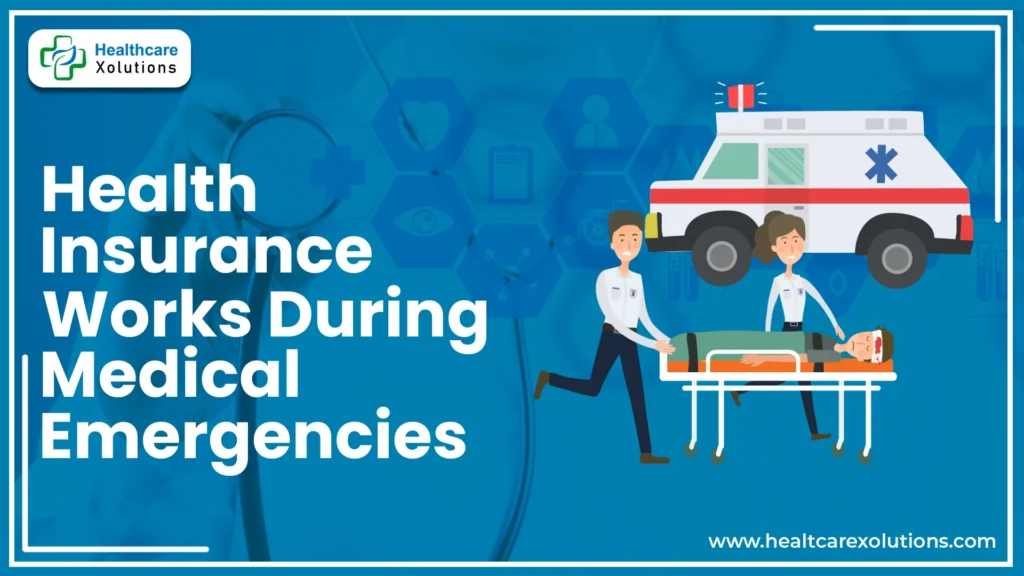How Health Insurance Works During Medical Emergencies?

Medical emergencies can occur unexpectedly, leaving individuals and families both physically and financially overwhelmed. Having health insurance ensures access to timely care and provides financial relief during such critical moments.
This guide explains how health insurance functions in emergencies and offers practical advice to help you navigate these situations confidently.
Key Takeaways:
- Health insurance provides financial and medical support during emergencies.
- Coverage typically includes ER visits, hospitalization, diagnostics, and prescriptions.
- Understanding your policy terms, including exclusions, is crucial.
- Staying prepared with your insurance card and knowing in-network facilities saves time and money.
Table of Contents
How Health Insurance Works During Medical Emergencies? Ultimate Guide
During a medical emergency, seeking immediate care is the priority. Health insurance policies typically include:
Access To Emergency Services:
- Emergency Room (ER) Visits: Covered without requiring prior authorization.
- Ambulance Services: Included for emergency transport.
- Urgent Care: Often covered under emergency provisions.
Network Vs. Out-of-Network Providers:
- In-Network Facilities: Minimize out-of-pocket costs.
- Out-of-Network Facilities: Emergency services are usually covered, but at higher rates.
Coverage Details For Medical Emergencies:
Health insurance policies often include these key services:
- Hospitalization: Coverage for room charges, surgeries, and medications.
- Diagnostic Tests: Includes X-rays, MRIs, and other emergency-related diagnostics.
- Prescriptions: Medications required during emergencies are covered per the plan’s drug formulary.
Pro Tip: Review your policy for specific coverage details and any exclusions that might apply.
Copayments and Deductibles:
Even in emergencies, you may face certain out-of-pocket costs:
- Co-Payments: Fixed amounts for services like ER visits.
- Deductibles: Initial amount paid before insurance coverage begins.
- Coinsurance: Percentage of costs shared with the insurer after meeting the deductible.
Understanding these cost-sharing elements helps you plan for potential expenses during emergencies.
Pre-Authorization and Claims Process:
- Pre-Authorization: Typically waived for emergency care but required for planned treatments.
- Claims Submission:
- In-Network Providers: Usually bill the insurer directly.
- Out-of-Network Providers: You may need to submit claims with supporting documents.
Post-Emergency Care and Recovery:
Health insurance also supports recovery after an emergency:
- Follow-Up Visits: Coverage for consultations and additional treatments.
- Rehabilitation Services: Includes physical therapy, counseling, or similar support.
- Long-Term Care: Coverage for chronic conditions resulting from emergencies.
Conclusion:
Health insurance acts as a critical safety net during medical emergencies, offering timely access to care while reducing financial stress. By understanding your policy’s terms, including coverage details, network limitations, and cost-sharing elements, you can maximize its benefits. Preparation, such as keeping your insurance details handy and knowing your in-network providers, ensures you can navigate emergencies confidently. From immediate care to post-treatment recovery, health insurance supports your health and well-being throughout the process.
FAQs:
Do I need pre-authorization for emergency care?
No, pre-authorization is usually waived in emergencies, though it’s required for planned or non-urgent treatments.
Are out-of-network services covered during emergencies?
Yes, but out-of-network care may involve higher out-of-pocket costs.
How can I reduce expenses during a medical emergency?
Seek in-network treatment, understand your plan’s cost-sharing terms, and maintain an emergency fund.
Does health insurance cover post-emergency care?
Yes, coverage often includes follow-up visits, rehabilitation, and long-term care, depending on your plan.
Can I get free emergency medical insurance?
Some government programs or catastrophic plans may provide limited free emergency coverage based on eligibility.
